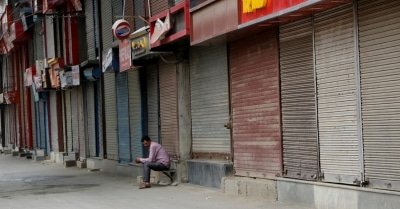<br>State governments have imposed area specific lockdowns of limited duration to curb the spread of Covid-19 infections.
However, these lockdowns have also disturbed the supply chains and revival plans of the industry.
Presently, the rising cases of Covid-19 infections have led to a reimposition of lockdowns in some important economic centres such as Bengaluru and Hyderabad.
Economy watchers have opined that these sudden local lockdowns have added to many uncertainties facing the Industry.
“These sudden localised or regional lockdowns have added to the uncertainties faced by businesses. It impacts their plans, strategy and supply chains, thereby slowing down the recovery process and in essence the revival of economic activity,” Sunil Kumar Sinha, Principal Economist, India Ratings & Research told IANS.
Inda-Ra has predicted a (-) 5.3 per cent contraction in India’s GDP for FY21 based on the challenges of rising infection rates, lower demand and localised lockdowns.
“The challenge in front of the economy is one of demand augmentation and this can happen if the government invests in quick turnaround infra projects and also provides a stimulus for private consumption.”
“Even though bumper harvest, healthy monsoon and festive season will side in demand generation, it is vital for the government to spend and to encourage consumption by all means possible for an early revival.”
According to Suman Chowdhury, Chief Analytical Officer at Acuit Ratings and Research: “Such recurring lockdowns at the local level will be witnessed across India over the next few months till the incidence of fresh cases declines to acceptable levels or a vaccine is discovered. Clearly, this will continue to disrupt the services and the industrial sector and increase the risks of a higher contraction in GDP in the current year.”
“The sectors such as retail, hospitality, transport, trade, real estate, and construction will be unable to witness any meaningful revival due to such disruptions.”
The rating agency has already revised its GDP contraction forecast to (-) 10 per cent for FY21.
“The Covid-19 shock has clearly derailed the growth path cyclically further, with 1QFY21 GDP looking to contract more than 25 per cent. Policy makers had earlier faced a stark trade-off between lives and livelihood as they imposed a national lockdown but now the localised lockdowns are hampering even the sequential growth momentum,” said Madhavi Arora, Lead Economist, FX and Rates for Edelweiss Securities.
“Meanwhile, tepid fiscal response and the monetary transmission asymmetry would only mean the downward growth cycle could stretch further. Domestic structural overhang in the form of strained balance sheet of private economic agents and global concerns might limit sustained sequential growth pick up ahead.”
Last week, rating agency ICRA revised downwards its forecast of India’s 2020-21 GDP contraction to 9.5 per cent from an earlier estimate of 5 per cent.
It cited the climbing Covid-19 infections resulting in a spate of localised lockdowns in some states and cities as the reason for the sharp downward revision.
ICRA said that these localised lockdowns are arresting the nascent recovery that had set in during May-June 2020.
“The Indian economy had started to recover from the troughs experienced in April 2020, when the lockdown was at its severest, and many sectors seemed to be adjusting to a new normal. However, the unabated rise in Covid-19 infections in the unlock phase and re-imposition of localised lockdowns in several states, appear to have interrupted this recovery,” Aditi Nayar, Principal Economist, ICRA, said in a statement.
“Given the severity of the pandemic and the duration of the safety measures that need to be employed, we now expect a deeper pace of GDP contraction in Q 2 FY2021 relative to our earlier forecast. We also anticipate more unevenness, as different regions move in and out of lockdowns, and persisting labour supply mismatches affecting supply chains and consumption patterns.”
(Rohit Vaid can be contacted at rohit.v@ians.in)
–IANS<br>rv/sn/bg
